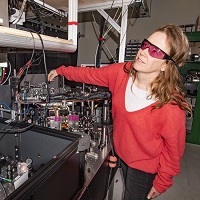Elizabeth Donley - 2020 SPIE Women in Optics Planner
Chief, Time and Frequency Division
National Institute of Standards and Technology, USA
 |
Country of Birth: USA
|
Supportive teachers and professors encouraged me and taught me that I had potential for a career in physics. My undergraduate professors knew that I would get a PhD before I knew it myself, and they made sure to communicate their expectations. They were right that it was the career for me but growing up I never would have imagined having a PhD. There was never a tradition for academic work in my family.
I am chief of the Time and Frequency Division at the National Institute of Standards and Technology, and I manage the technical activities and budgets for a research organization of about 120 people.
Navigating the social constructs in the sciences has presented bigger obstacles to me than the technical work. I had some problems when I transitioned from being a postdoc in an academic world where I was mentored by advisors to having a long-term position as a research scientist at a national lab where I had to compete with my peers. Doing good technical work was only part of the job. Working within my position of the pecking order was also very important and it was not obvious to me what that entailed. I believe women have had a harder time with this than men since physics has been so heavily dominated by men. Achieving recognition for my work in the hierarchical and competitive research world was an active endeavor that did not feel natural or pleasant at first.
Perseverance was the key to success. It took time for me to be comfortable in the environment and build my reputation as a strong scientist.
Focus first on your own technical excellence. Secondly, keep strong and open communication with your colleagues, especially with your supervisors. It may not be obvious, but social skills are as important as technical skills for your success. You need both.
Being a professional scientist is challenging but rewarding work. Working in STEM fields, you learn new things and keep an active mind through your whole career. You also get to feel the excitement of passing on the frontier of knowledge to the next generation of scientists. It’s rewarding to see women gaining a stronger foothold in the sciences over time and feel more at home in the sciences. If you love it, just do it.